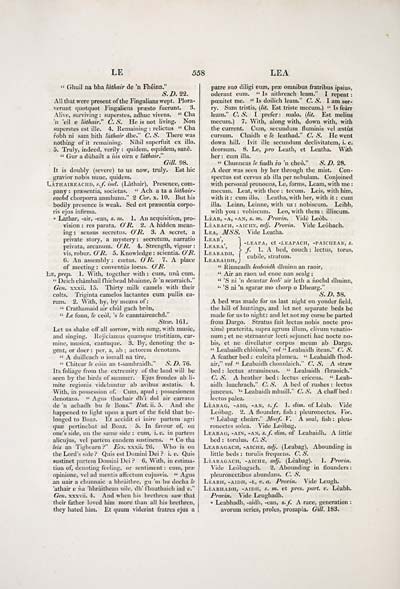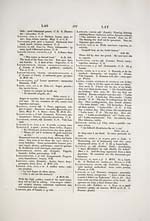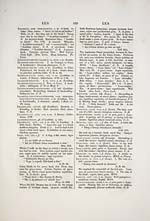Download files
Complete book:
Individual page:
Thumbnail gallery: Grid view | List view

LE 5,
" Ghuil na bha iathair de 'n Fhèinn."
All that were present of the Fingalians wept. Plora-
verunt quotquot Fingaliens praesto fuerunt. 3.
Alive, surviving : superstes, adhuc vivens. " Cha
'n 'eil e tathair." C. S. He is not living. Non
superstes est ille. 4. Remaining : relictus " Cha
i=obh ni sam bith tàtìiair dhe." C. .S". There was
nothing of it remaining. Nihil superfuit ex illo.
5. Truly, indeed, verily : quidem, equidem, sane.
" Gur a dùbailt a nis oirn e tathair."
Gill. 98.
It is doubly (severe) to us now, truly. Est hie
gravior nobis nunc, quidem,
LÀTHAiREACHD, s.f. iìid. (Làthair), Presence, com-
pany : praesentia, societas. " Ach a ta a tatlmir-
eachd chorporra anmhunn." 2 Cor. x.
bodily presence is weak. Sed est praesentia corpo-
ris ejus infirma.
* Lathar, -air, -ean, s. m. 1. An acquisition, pro-
vision : res parata. O'R. 2. A liidden mea
ing: sensus secretus. O'R. 3. A secret,
private story, a mystery : secretum,
privata, arcanum. O'R. 4. Strength, vigour
vis, robur. OR. 5. Knowledge : scientia. O'R.
6. An assembly: coetus. OR. 7. A place
of meeting : conventus locus. O'R.
hE,prep. 1. With, together with: cum, una cum.
" Deich chàmhail fliichead bhainne, fe 'n searraich."
Gen. xxxii. 15. Thirty milk camels with their
colts. Triginta camelos lactantes cum puUis ea-
rum. 2. With, by, by means of:
" Crathamaid air chùl gach bròn,
" Le fonn, te ceòl, 's te canntaireachd."
Stew. 161.
Let us shake off all sorrow, with song, with music,
and singing. Rejiciamus quamque tristitiani, car-
mine, musica, cantuque. 3. By, denoting the a-
gent, or doer : per, a, ab ; actorem denotans.
" A duilleach o iomall na tire,
" Chitear te eòin an t-samhraidh." S.D. 76.
Its foliage from the extremity of the land will be
seen by the birds of summer. Ejus frondes ab li-
mite regionis videbuntur ab avibus aestatis. 4.
With, in possession of. Cum, apud ; possesionem
denotans. " Agus thachair dh'i dol air earrann
de 'n achadh bu fe Boas." Rut. ii. 5. And she
happened to light upon a part of the field that be-
longed to Boaz. Et accidit ei inire partem agri
quae pertinebat ad Boaz. 5. In favour of, on
one's side, on the same side : cum, i. e. in partem
alicujus, vel partem eandem sustinens. " Co tha
teis an Tighearn ?" Ecs. xxxii. 26. Who is on
the Lord's side ? Quis est Domini Dei ? i. e. Quis
sustinet partem Domini Dei ? 6. With, in estima-
tion of, denoting feeling, or sentiment : cum, pra;
opinione, vel ad mentis affectum cujusvis. " Agus
an uair a chunnaic a bhràithre, gu 'm bu docha te
'athair e na 'bhraithean uile, dh' f huathaich iad e."
Gen. xxxvii. 4. And when his brethren saw that
their father loved him more than all his brethren,
they hated him. Et quum viderint fratres ejus a
J LEA
patre suo diligi eum, prse omnibus fratribus ipsius,
oderant eum. " Is aithreach leam." I repent :
pocnitet me. " Is doilich team." C. *S'. I am sor-
ry. Sum tristis, (lit. Est triste raecum.) " Is feàrr
leam." C. S. I prefer : malo. (lit. Est melius
mecum.) 7. With, along with, down with, with
the current. Cum, secundum fluminis vel aestus
cursum. Chaidh e fe leathad." C. S. He went
down hill. Ivit ille secundum declivitatem, i. e.
deorsum. 8. Le, pro Leath, et Leatha. With
her : cum ilia.
" Chunncas ie fiadh fo 'n cheò." S. D. 28.
A deer was seen by her tlu-ough the mist. Con-
spectus est cervus ab ilia per nebulam. Conjoined
with personal pronouns, Le, forms, Leam, with me :
mecum. Leat, with thee : tecum. Leis, with him,
with it : cum illo. Leatha, with her, with it : cum
ilia. Leinn, Leinne, with us : nobiscum. Leibh,
with you : vobiscum. Leo, with them : illiscum.
LÈAB, -A, -AN, s. m. Provin. Vide Leòb.
LÈABACH, -AicirE, adj. Provin. Vide Leòbach.
Lea, MSS. Vide Leatha.
Leabadh
" Rinneadh leabaidh dhuinn an raoir,
" Air an raon ud cnoc nan sealg ;
" 'S ni 'n deantar leab' air leth a riochd dhuinn,
'• 'S ni 'n sgarar mo chorp o Dhearg."
S. D. 38.
A bed was made for us last night on yonder field,
the hill of huntings, and let not separate beds be
made for us to night: and let not my corse be parted
from Dargo. Stratus fuit lectus nobis nocte pro-
ximè praeterita, supra agrum ilium, clivum venatio-
num ; et ne sternantur lecti sejuncti hac nocte no-
bis, et ne divellatur corpus meum ab Dargo.
" Leabaidh chlòimh," vel " Leabaidli itean." C. S.
A feather bed: culcita plumea. " Leabaidh fhod-
air," vel " Leabaidh chonnlaich." C, S. A straw
bed : lectus straraineus. " Leabaidh fhraoich."
C. S. A heather bed : lectus ericeus. " Leab-
aidh luachrach." C »S'. A bed of rushes : lectus
junceus. ■" LeabaidJi mhuill." C. «S". A chaff bed:
lectus palea.
LÈABAG, -AiG, -AN, S.f. 1. dim. of Leab. Vide
Leòbag. 2. A flounder, fish : pleuronectes. Voc.
" Lèabag cheàrr." 3I(/cf. V. A soal, fish : pleu-
ronectes solea. Vide Leòbag.
Leabag, -ain, -an, s.f. dim. of Leabaidh. A little
bed : torulus. C. S.
Leabagach, -aiche, adj. (Leabag), Abounding in
little beds : torulis fi-equens. C. S.
Leabagach, -aiche, adj. (Leabag). I. Provin.
Vide Leòbagach. 2. Abounding in flounders :
pleuronectibus abundans. C. S.
LÈABH, -AiDH, -£,, V. a. Provin. Vide Leugh.
LÈABHADH, -AIDH, s. m. et pves. part. v. Lèabh.
Provin. Vide Leughadh.
• Leabhadh, -aidh, -ean, s.f. A race, generation :
avorum series, proles, prosapia. Gill. 183.
" Ghuil na bha iathair de 'n Fhèinn."
All that were present of the Fingalians wept. Plora-
verunt quotquot Fingaliens praesto fuerunt. 3.
Alive, surviving : superstes, adhuc vivens. " Cha
'n 'eil e tathair." C. S. He is not living. Non
superstes est ille. 4. Remaining : relictus " Cha
i=obh ni sam bith tàtìiair dhe." C. .S". There was
nothing of it remaining. Nihil superfuit ex illo.
5. Truly, indeed, verily : quidem, equidem, sane.
" Gur a dùbailt a nis oirn e tathair."
Gill. 98.
It is doubly (severe) to us now, truly. Est hie
gravior nobis nunc, quidem,
LÀTHAiREACHD, s.f. iìid. (Làthair), Presence, com-
pany : praesentia, societas. " Ach a ta a tatlmir-
eachd chorporra anmhunn." 2 Cor. x.
bodily presence is weak. Sed est praesentia corpo-
ris ejus infirma.
* Lathar, -air, -ean, s. m. 1. An acquisition, pro-
vision : res parata. O'R. 2. A liidden mea
ing: sensus secretus. O'R. 3. A secret,
private story, a mystery : secretum,
privata, arcanum. O'R. 4. Strength, vigour
vis, robur. OR. 5. Knowledge : scientia. O'R.
6. An assembly: coetus. OR. 7. A place
of meeting : conventus locus. O'R.
hE,prep. 1. With, together with: cum, una cum.
" Deich chàmhail fliichead bhainne, fe 'n searraich."
Gen. xxxii. 15. Thirty milk camels with their
colts. Triginta camelos lactantes cum puUis ea-
rum. 2. With, by, by means of:
" Crathamaid air chùl gach bròn,
" Le fonn, te ceòl, 's te canntaireachd."
Stew. 161.
Let us shake off all sorrow, with song, with music,
and singing. Rejiciamus quamque tristitiani, car-
mine, musica, cantuque. 3. By, denoting the a-
gent, or doer : per, a, ab ; actorem denotans.
" A duilleach o iomall na tire,
" Chitear te eòin an t-samhraidh." S.D. 76.
Its foliage from the extremity of the land will be
seen by the birds of summer. Ejus frondes ab li-
mite regionis videbuntur ab avibus aestatis. 4.
With, in possession of. Cum, apud ; possesionem
denotans. " Agus thachair dh'i dol air earrann
de 'n achadh bu fe Boas." Rut. ii. 5. And she
happened to light upon a part of the field that be-
longed to Boaz. Et accidit ei inire partem agri
quae pertinebat ad Boaz. 5. In favour of, on
one's side, on the same side : cum, i. e. in partem
alicujus, vel partem eandem sustinens. " Co tha
teis an Tighearn ?" Ecs. xxxii. 26. Who is on
the Lord's side ? Quis est Domini Dei ? i. e. Quis
sustinet partem Domini Dei ? 6. With, in estima-
tion of, denoting feeling, or sentiment : cum, pra;
opinione, vel ad mentis affectum cujusvis. " Agus
an uair a chunnaic a bhràithre, gu 'm bu docha te
'athair e na 'bhraithean uile, dh' f huathaich iad e."
Gen. xxxvii. 4. And when his brethren saw that
their father loved him more than all his brethren,
they hated him. Et quum viderint fratres ejus a
J LEA
patre suo diligi eum, prse omnibus fratribus ipsius,
oderant eum. " Is aithreach leam." I repent :
pocnitet me. " Is doilich team." C. *S'. I am sor-
ry. Sum tristis, (lit. Est triste raecum.) " Is feàrr
leam." C. S. I prefer : malo. (lit. Est melius
mecum.) 7. With, along with, down with, with
the current. Cum, secundum fluminis vel aestus
cursum. Chaidh e fe leathad." C. S. He went
down hill. Ivit ille secundum declivitatem, i. e.
deorsum. 8. Le, pro Leath, et Leatha. With
her : cum ilia.
" Chunncas ie fiadh fo 'n cheò." S. D. 28.
A deer was seen by her tlu-ough the mist. Con-
spectus est cervus ab ilia per nebulam. Conjoined
with personal pronouns, Le, forms, Leam, with me :
mecum. Leat, with thee : tecum. Leis, with him,
with it : cum illo. Leatha, with her, with it : cum
ilia. Leinn, Leinne, with us : nobiscum. Leibh,
with you : vobiscum. Leo, with them : illiscum.
LÈAB, -A, -AN, s. m. Provin. Vide Leòb.
LÈABACH, -AicirE, adj. Provin. Vide Leòbach.
Lea, MSS. Vide Leatha.
Leabadh
" Rinneadh leabaidh dhuinn an raoir,
" Air an raon ud cnoc nan sealg ;
" 'S ni 'n deantar leab' air leth a riochd dhuinn,
'• 'S ni 'n sgarar mo chorp o Dhearg."
S. D. 38.
A bed was made for us last night on yonder field,
the hill of huntings, and let not separate beds be
made for us to night: and let not my corse be parted
from Dargo. Stratus fuit lectus nobis nocte pro-
ximè praeterita, supra agrum ilium, clivum venatio-
num ; et ne sternantur lecti sejuncti hac nocte no-
bis, et ne divellatur corpus meum ab Dargo.
" Leabaidh chlòimh," vel " Leabaidli itean." C. S.
A feather bed: culcita plumea. " Leabaidh fhod-
air," vel " Leabaidh chonnlaich." C, S. A straw
bed : lectus straraineus. " Leabaidh fhraoich."
C. S. A heather bed : lectus ericeus. " Leab-
aidh luachrach." C »S'. A bed of rushes : lectus
junceus. ■" LeabaidJi mhuill." C. «S". A chaff bed:
lectus palea.
LÈABAG, -AiG, -AN, S.f. 1. dim. of Leab. Vide
Leòbag. 2. A flounder, fish : pleuronectes. Voc.
" Lèabag cheàrr." 3I(/cf. V. A soal, fish : pleu-
ronectes solea. Vide Leòbag.
Leabag, -ain, -an, s.f. dim. of Leabaidh. A little
bed : torulus. C. S.
Leabagach, -aiche, adj. (Leabag), Abounding in
little beds : torulis fi-equens. C. S.
Leabagach, -aiche, adj. (Leabag). I. Provin.
Vide Leòbagach. 2. Abounding in flounders :
pleuronectibus abundans. C. S.
LÈABH, -AiDH, -£,, V. a. Provin. Vide Leugh.
LÈABHADH, -AIDH, s. m. et pves. part. v. Lèabh.
Provin. Vide Leughadh.
• Leabhadh, -aidh, -ean, s.f. A race, generation :
avorum series, proles, prosapia. Gill. 183.
Set display mode to: Large image | Transcription
Images and transcriptions on this page, including medium image downloads, may be used under the Creative Commons Attribution 4.0 International Licence unless otherwise stated. ![]()
| Early Gaelic Book Collections > Blair Collection > Dictionarium scoto-celticum > Volume I > (628) |
|---|
| Permanent URL | https://digital.nls.uk/76582485 |
|---|
| Description | Lacks half title page in Volume 1. |
|---|---|
| Attribution and copyright: |
|
| Description | A selection of books from a collection of more than 500 titles, mostly on religious and literary topics. Also includes some material dealing with other Celtic languages and societies. Collection created towards the end of the 19th century by Lady Evelyn Stewart Murray. |
|---|
| Description | Selected items from five 'Special and Named Printed Collections'. Includes books in Gaelic and other Celtic languages, works about the Gaels, their languages, literature, culture and history. |
|---|

